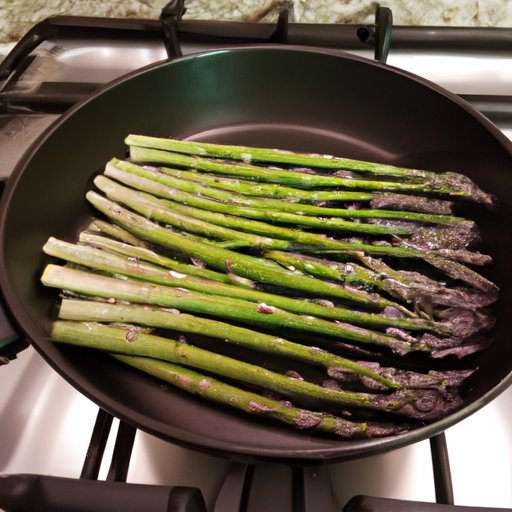
I. Introduction
Are you looking for a delicious and healthy side dish that is quick and easy to prepare? Look no further than asparagus! While cooking asparagus might seem daunting at first, it’s actually quite simple and straightforward, especially when prepared on the stovetop. In this article, we will walk you through the entire process, from selecting the right asparagus to serving the cooked dish. We will also provide tips on how to preserve its nutrients, different flavoring options, and alternative cooking methods to help you master this versatile vegetable.
II. Step-by-Step Guide
1. Selecting the Right Asparagus
When selecting asparagus, look for straight and firm stalks that are bright green in color. Avoid any asparagus that is wilted, slimy, or discolored. Thin stalks are perfect for roasting or boiling, while thicker ones are ideal for sautéing or grilling.
2. Preparing and Cleaning the Asparagus
To prepare the asparagus, cut off the woody ends of the stalks, about 1-2 inches from the bottom. You can use a knife or snap them off with your hands. Rinse the asparagus under cold water to remove any dirt or grit.
3. Cooking the Asparagus on Stove Top
Heat a large pan over medium-high heat and add a tablespoon of oil. Once the oil is hot, add the asparagus to the pan in a single layer and sprinkle with salt and pepper. Cook for 4-6 minutes, stirring occasionally, until the asparagus is crispy and tender.
4. Tips on Serving Cooked Asparagus
Serve the cooked asparagus immediately, while it’s still hot, and sprinkle it with your favorite toppings such as grated Parmesan cheese, lemon zest, or nuts. You can also mix it with other vegetables, such as mushrooms and onions, or serve it as a side with roasted meat.
III. Quick and Easy Method
If you’re looking for a quick and easy way to cook asparagus, here’s a simple recipe you can try:
Ingredients:
- 1 pound of asparagus, washed and trimmed
- 1 tablespoon of olive oil
- Salt and Pepper to taste
Instructions:
- Heat a large skillet over medium-high heat, and add olive oil.
- Add trimmed asparagus to the skillet and season with salt and pepper.
- Sauté the asparagus for 4-6 minutes until it’s tender and crispy.
- Serve immediately with your favorite toppings.
IV. Health Benefits
Asparagus is a superfood that is rich in vitamins, minerals, and fiber. One cup of cooked asparagus provides nearly half the daily recommended amount of folate, which is essential for red blood cell production. It’s also a good source of vitamins A, C, and E, and minerals such as potassium and iron.
To preserve these nutrients, it’s best to avoid overcooking asparagus. Steaming, roasting, or grilling are recommended cooking methods. Adding lemon juice or vinegar can also help to retain the nutrients.
V. Different Flavoring Options
Asparagus is a versatile vegetable that can be flavored in many ways. Here are some flavoring options for you to try:
1. Lemon and Garlic
Melt 2 tablespoons of butter in a pan over medium heat. Add 1 minced garlic and cook for a minute. Add a tablespoon of lemon juice and asparagus and sauté for 5-7 minutes.
2. Parmesan Cheese
Sprinkle grated Parmesan cheese over cooked asparagus. Add chopped parsley and lemon zest for garnishing.
3. Balsamic Vinaigrette
Drizzle balsamic vinaigrette over the cooked asparagus. Add cherry tomatoes and chopped onion for extra flavor.
VI. Cook Asparagus in Different Ways
While cooking asparagus on the stove top is simple and quick, there are other methods you can try to change things up:
1. Roasting
Preheat the oven to 400°F and place asparagus on a baking sheet. Drizzle with olive oil and season with salt and pepper. Roast for 12-15 minutes or until tender and crispy.
2. Grilling
Preheat the grill to medium heat. Brush asparagus with olive oil and sprinkle with salt and pepper. Grill for 4-6 minutes, turning occasionally, until tender and charred.
VII. Conclusion
Cooking asparagus on stove top is easy when you follow these simple steps. Select fresh, firm asparagus and cook over medium-high heat with oil, salt, and pepper for best results. Remember to keep an eye on the cooking time to prevent overcooking and preserve its nutrients. There are many delicious flavoring options to choose from, such as lemon and garlic or balsamic vinegar. And don’t forget to experiment with different cooking methods to discover your favorite way to enjoy this healthy and versatile vegetable.




